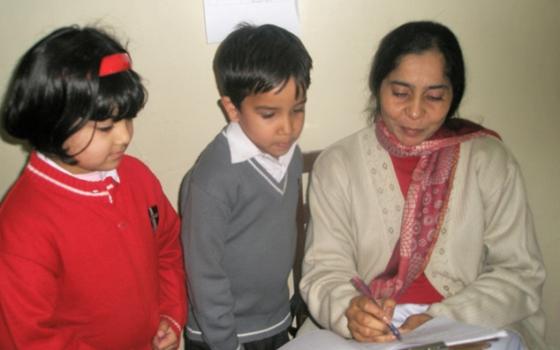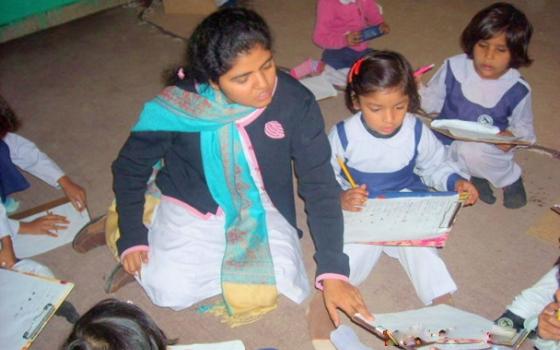In 1958, eight Dominican sisters from Sparkill, N.Y., traveled to Bahawalpur, Pakistan, as missionaries. Within seven years, a Pakistani congregation of Dominican sisters was receiving its first postulants. Today, there are 14 Pakistani Sparkill Dominicans sisters serving Pakistan’s Christian community in education and health ministries.
Two of the sisters – Catherine Bashir, a teacher, and Violet Sampour, a school nurse – spoke with the Global Sisters Report about their ministry when they were visiting their congregation’s motherhouse in the United States in August.
My guess is that not many people are familiar with Pakistan’s pastoral needs. What would you say are the needs in your communities?
Bashir: The biggest need in our community is education. I live in the village where people work on the fields, and they are very poor. Because of poverty, children help their parents, so I feel the need to make the parents aware that they should send their children to school, because, if they’re educated, they can get good jobs and they can be successful.
Sampour: Children come to school malnourished because they don’t get balanced diets, so sometimes we go to their homes and bring the children breakfast. Sometimes they come without breakfast, so we have to feed them from our own house. There is no health insurance in Pakistan, so if people don’t have money to go to the doctor, they use home remedies. That is why this work is important with children.
Sr. Violet, you touched on this a little, but how do you – as sisters – address these needs?
Sampour: We have a health awareness program for women and youth. We meet with mothers when we visit children and we talk about hygiene and balanced diets. We visit the sick, elderly people. We arrange medical camps. Last year, we had eye checkups and HIV and Hepatitis C tests. Hepatitis is very common in Pakistan because there is no clean water and, besides that, people buy food from open carts outside. We also have a vaccination program.
What success stories have you seen?
Bashir: We try to provide children with quality education, and our success is when students pass their tests and they go for further study. Sometimes they go for professional training like nursing. Sometimes they go to the colleges for further studies. Many of our students, they come back and they work in our schools. Some become teachers and come back and give service to the schools. That’s the success.
Working with these children, what gives you hope?
Bashir: To give them a good education and to help them be able to get further education, to see them complete their schooling and get good jobs and then support their family – that gives us joy and hope.
Sampour: There are many families that are on drugs, and the children know everything – especially when the drugs are made in the house. They often make a kind of liquor and children know the name, they know how to sell it, where to go – all these things.
Because many families are destroyed and there is poverty, the children have to sell the liquor. They cannot find other work because they are a minority. When children come to our school, we try to help them opt not to use the drugs or go into this liquor business. I hope that slowly it will work. If we reach even 10 percent, I think that is a big hope for us.
[Dawn Cherie Araujo is a staff reporter for Global Sisters Report.]




